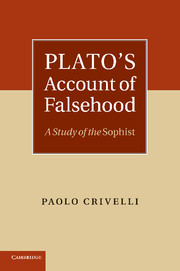Book contents
- Frontmatter
- Contents
- Acknowledgements
- Abbreviations of titles of Plato's works
- Note on the text
- Introduction
- Chapter 1 The sophist defined
- Chapter 2 Puzzles about not-being
- Chapter 3 Puzzles about being
- Chapter 4 The communion of kinds
- Chapter 5 Negation and not-being
- Chapter 6 Sentences, false sentences, and false belief
- Appendix The Sophist on true and false sentences
- References
- Index of names
- Index of subjects
- Index of passages cited
Chapter 1 - The sophist defined
Published online by Cambridge University Press: 05 February 2012
- Frontmatter
- Contents
- Acknowledgements
- Abbreviations of titles of Plato's works
- Note on the text
- Introduction
- Chapter 1 The sophist defined
- Chapter 2 Puzzles about not-being
- Chapter 3 Puzzles about being
- Chapter 4 The communion of kinds
- Chapter 5 Negation and not-being
- Chapter 6 Sentences, false sentences, and false belief
- Appendix The Sophist on true and false sentences
- References
- Index of names
- Index of subjects
- Index of passages cited
Summary
The stated purpose of the Sophist is to define the sophist. The definition is pursued by applying the method of division, to a discussion of which section 1.2 is devoted. Plato offers a salvo of six descriptions of the sophist based on the method of division: each one focuses on certain traits shared by at least some sophists. Section 1.3 is about the connection between the sophist and the concept of appearing. The six descriptions of the sophist show that he appears to have many skills. Precisely the point that the sophist appears to have many skills provides the starting point for a new characterization, which turns upon the concept of appearing: the essence of the sophist is exactly his appearing to have skills which he in fact lacks. But the concept of appearing and the connected concept of falsehood generate puzzles: until these remain unresolved, the sophist can evade ‘capture by definition’.
Characters and task of the dialogue
The task of defining the sophist. Here are the last words of the Theaetetus (210d1–4, Socrates is speaking): ‘Now I must go to the King’s Porch to meet the indictment that Meletus has brought against me; but let us meet here again in the morning, Theodorus’. And here is the beginning of the Sophist (216a1–2, Theodorus is speaking): ‘We have come at the proper time by yesterday’s agreement, Socrates’. Thus, the conversation recorded in the Sophist is a continuation of that of the Theaetetus. It may be inferred that the Sophist’s dramatic date is 399 bc, the year of Socrates’ death. It may also be inferred that the discussants of the Sophist include those of the Theaetetus: Socrates, Theodorus, Theaetetus, Young Socrates, and other unnamed adolescents. But there is also someone else.
- Type
- Chapter
- Information
- Plato's Account of FalsehoodA Study of the Sophist, pp. 13 - 27Publisher: Cambridge University PressPrint publication year: 2011



